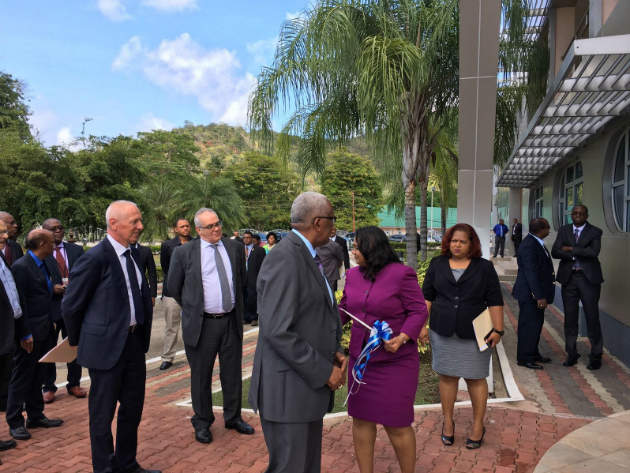
The part played by the shipping industry in reducing global greenhouse emissions is under the spotlight.
The International Maritime Organization (IMO), the United Nations agency concerned with the safety of shipping and cleaner oceans, is under increased scrutiny for their efforts to lower emissions and increase efficiency.

Discover B2B Marketing That Performs
Combine business intelligence and editorial excellence to reach engaged professionals across 36 leading media platforms.
Maritime transport emits around 1,000 million tonnes of CO2 annually and is responsible for about 2.5% of global greenhouse gas emissions (GHG), according to the 3rd IMO GHG study. If left unchecked, shipping emissions are predicted to increase between 50% and 250% by 2050, endangering the internationally agreed goal of keeping global temperature increase to below 2°C compared to pre-industrial levels.
Developing countries are crucial players
Nations around the world identified as Least Developed Countries (LDCs), often found across Africa and Asia & Pacific, as well as Small Island Developing States (SIDSs), are seen as crucial players in the fight against worsening climate change. Often, communities from these regions, particularly shore-based settlements, are the first to suffer the consequences of global warming, which threatens their livelihoods.
This is why the IMO’s latest project, developed in cooperation with the European Union (EU), is looking to harness the skills, knowledge and expertise of these regions in developing new tools to increase maritime efficiency.
The Global MTTC Network (GMN) project, officially titled ‘Capacity Building for Climate Change Mitigation in the Maritime Shipping Industry’, focuses on enabling developing countries to effectively implement energy efficiency measures through technical assistance, capacity building and promoting technical cooperation.

US Tariffs are shifting - will you react or anticipate?
Don’t let policy changes catch you off guard. Stay proactive with real-time data and expert analysis.
By GlobalDataThe heart of the project lies in setting up five Maritime Technology Cooperation Centres (MTCCs), located in Africa, Asia, Latin America, the Caribbean and the Pacific, which together will form a global network.
Bringing the change into the shipping industry
In January 2016, the project was awarded €10m in funding by the European Commission. Since then, four out of the five chosen centres have been announced, following a tendering process, with each application reviewed by a Technical Evaluation Committee against strict selection criteria.
The host institutions chosen so far are: the International Maritime University of Panama (UMIP), to host the MTTC for Latin America; Jomo Kenyatta University of Agriculture and Technology (JKUAT) for Africa; Shanghai Maritime University in China, representing MTTCs Asia; and the University of Trinidad and Tobago (UTT) in the Caribbean.
“GMN Pilot projects and capacity building activities are the examples of bringing the change into the shipping industry and contribute to combating climate change,” says Tamar Barabadze, project manager at the IMO. “Overall, the project is expected to positively contribute to the limitation and reduction of GHG emissions from maritime transport related to developing countries.”
Over the next two years, the project hopes to incentivise greater uptake of energy efficient technologies and operations by ship owners and operators, and improve capacity of public administrations to implement and enforce international shipping rules.
It particularly looks at increasing the number of signatories to MARPOL Annex VI, which focuses on the global reduction in emissions of sulphur oxides (SOx), nitrogen oxides (NOx) and particulate matter from ships.
Drawing on local know-how
Before 2019, each MTCC will complete two pilot projects related to low-carbon technologies and operations in maritime transport and data collection and reporting systems from the ships to feed back into the global regulatory process.
The activities of each host institution will focus on capacity building and will look to promote the application of low-carbon technologies in maritime transport and help participating countries develop national energy efficiency policies and measures for their maritime sectors.
“The centres are encouraged to work in partnership with the maritime industry, academia, private sector, and others,” Barabadze says.
“At a minimum, the MTTCs will each undertake to deliver four national and two regional workshops within their respective regions over the next three years.”
They will also establish voluntary pilot data collection and reporting systems from the ships to feed back into the global regulatory process.
For example, the University of Trinidad and Tobago in the Caribbean will be collaborating with the 16 countries in the region, as well as institutions, companies and international bodies, to achieve up to 75% reduction in ships’ energy consumption and CO2 emissions.
The University, located in the North-Western Peninsula of Trinidad and Tobago, has long been dedicated to sustainable development and the efficient use of resources, and has been hosting specialised programmes dedicated to energy efficiency, environmental studies and marine research.
“As host of the MTCC-Caribbean, UTT will continue to make an indelible impact on the local, regional and international maritime sectors,” a press release from the institution reads. “The University looks forward to the many contributions which can be enacted through this designation and will carry on its efforts to build capacity in the international maritime industry.”
The fifth and final MTTC, to represent the Pacific, is expected to be chosen over the coming weeks.



